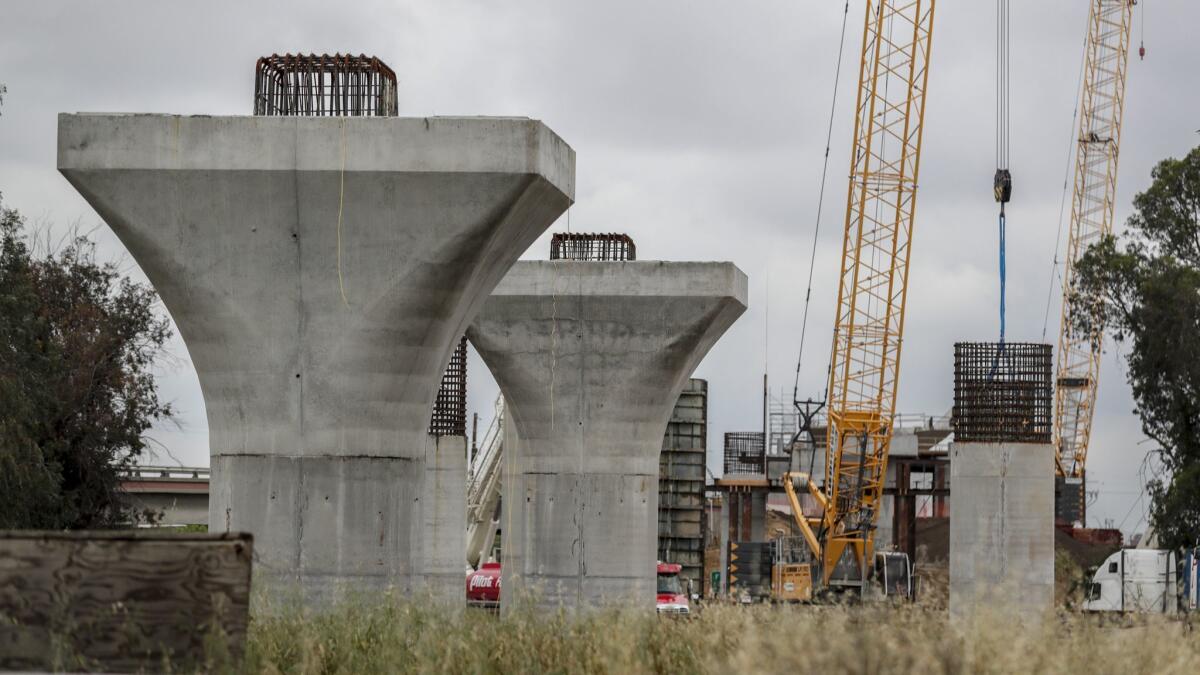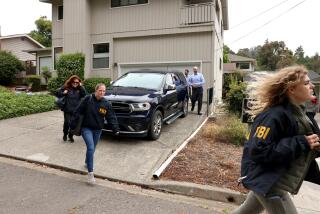California high-speed rail board member under investigation for potential conflict

The state Fair Political Practices Commission is investigating allegations that Ernest Camacho, a board member of the California High-Speed Rail Authority, has a conflict of interest — the second such investigation the watchdog agency has launched involving the bullet train.
The probe is a response to allegations made by Assemblyman Jim Patterson (R-Fresno), a long-time opponent of the project, in a Sept. 4 letter.
Patterson alleged that Camacho’s routine financial disclosure form indicates that his firm, Pacifica Services, has contracts with Tutor Perini and Jacobs Engineering, both of which the rail authority hired to perform major work.
Camacho declined to comment, as did the rail authority.
Patterson said his staff’s findings about Camacho‘s business relationships raise concerns about inside dealmaking at the rail authority.
“Even the appearance of that kind of conflict raises suspicion,” he said.
The biggest immediate problem for California’s high-speed rail project is land acquisitions. Mismanagement of them is contributing to construction delays, cost increases, litigation and the launch of a federal audit.
Camacho’s firm does not have a contract or any business arrangement with the High-Speed Rail Authority. But it does have a contract with the Metropolitan Transportation Authority, which is building the Purple Line subway project in L.A., according to the Metro website.
Pacifica Services is a subcontractor to the firm that is managing and overseeing Tutor Perini’s work for Metro, essentially making it a second-tier watchdog over Tutor Perini, according to an official knowledgeable about the matter.
Pacifica Services also had a subcontract with Jacobs Engineering, which involved a plan to build a new Los Angeles County jail. But that contract was signed before Camacho joined the rail board and the project has since been canceled by the Board of Supervisors, the official noted.
Camacho was the first rail authority board member with a substantial background in engineering, construction and project delivery, joining other board members who are union officials, politicians and developers.
The commission this summer opened an investigation of Roy Hill, who has been the top executive on the project for consultant WSP and who held the title deputy chief operating officer.
At the rail authority’s request, WSP suspended Hill in June. That investigation was also prompted by a complaint by Patterson, who alleged that Hill held a large stock holding in Jacobs Engineering when he signed a contract modification for the firm’s work.
An FPPC spokesman said the commission, which enforces state laws on political campaigning, lobbying and conflicts of interest, is still investigating the Hill matter. The spokesman said the Camacho investigation was launched after the commission conducted a formal review of Patterson’s letter.
Camacho was reappointed to the rail board this summer by Senate chief Toni Atkins (D-San Diego).
Brian Kelly, rail authority chief executive, lauded Camacho in a recent newsletter, saying, “During his tenure on the Board, Director Camacho has played a key role in overseeing the project’s move from delivery to construction and beyond.”
Patterson said the Jacob and Tutor deals may or may not benefit Pacifica Services. But said he is troubled by Camacho’s support for shifting some of the bullet train construction funds from the Central Valley to the Bay Area and Southern California.
A plan is quietly gaining support to truncate California’s troubled high-speed rail construction project in the Central Valley and spend some of the remaining billions of dollars in Southern California and the Bay Area.
Patterson said that he is opposed to the proposal, which surfaced in the Legislature this summer, asserting that it would not leave enough money to complete the work underway in the Central Valley.
“They are already running out of money,” he said. “We are supposed to be satisfied that they leave us ripped up?”
More to Read
Sign up for Essential California
The most important California stories and recommendations in your inbox every morning.
You may occasionally receive promotional content from the Los Angeles Times.











